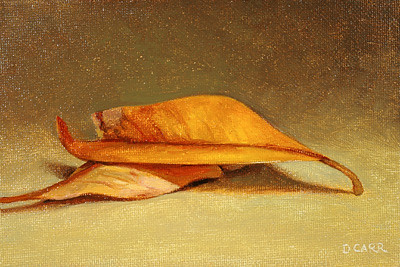While painting the dry, brown and nibbled-at portion of the leaf, I was reminded of the Old English riddle I revisited the other day. The challenge of translating is similar to that of painting from observation, in that an attempt to "literally" restate what's presented to you isn't usually the best way (I am still learning this). Of course, all subjects get simplified in a painter's own peculiar way, even subconsciously, but invariably there are sections that have to be more dramatically edited in order for them to make sense. That section of the leaf was challenging enough because of the complexity of color and pattern on the surface, but made trickier by the small working area. I took on the challenge instead of changing the leaf entirely to avoid it, and worked and reworked that small part until I felt it was both simplified enough and yet had enough of that quality I found interesting to begin with. I don't know how successful I've made it, or how I would have done it differently. But the nice thing is that no one but I would know for sure what the leaf actually looked like.
As I worked on the riddle of the swan I liked the specificity of some of the Old English words and kept them literal. But a few lines were more demanding. "Flóde ond foldan" is literally "flood and earth," or, flow/tide/sea/stream/river and dry land/soil/ground/country. In my mind the literal approach seemed the simpler one, but the more I thought the more detached it felt from the sense of the poem. The challenge was to find a better way and one that wasn't an attempt to outdo the well-crafted original with something I had just crafted. I'm not the first to suggest "field," though that has its word, feld (but they are probably related). And even though the whole riddle speaks symbolically of the swan as a "ghost" traveling between worlds, the specific ideas of field and stream make more sense to me in creating a picture of the animal than weightier symbolic terms like earth and flood.
More of a challenge was "oþþe þá wíc búge" in the second line (or third half-line). It literally says "or the dwelling(s) inhabit" - it's not clear to me if it's plural. That is, occupy/dwell (in) a dwelling/house/village. Wíc survives in some place names as -wich or -wick and so I took license and thought of it in a broad sense, unspecific like "ground" and "waters," hence my pick of the word "place."
Before starting to write this I found the blog "Brave New Words" which talks about translation. It seems interesting and I'll have to read it when I have more time.




1 comment:
Lovedd reading this thanks
Post a Comment